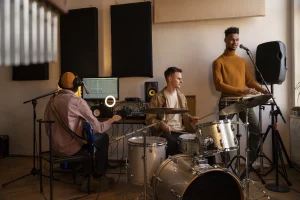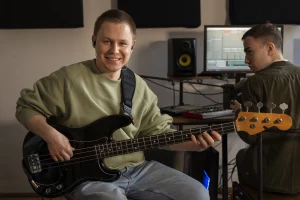Introduction
Music has always played a critical role in shaping the emotional landscape of films and television shows. From setting the tone to deepening the narrative, it influences how audiences perceive characters and stories. This article explores the key functions of music in film and TV production, how it enhances storytelling, and the role it plays in modern media.
The Rise of Music in Film and TV Production

Music has played an essential role in storytelling for centuries, but its importance in film and TV production has grown significantly over time. As technology advanced, filmmakers began to recognize the potential of music to enhance narratives. The rise of synchronized sound in the late 1920s marked a turning point, making it possible for music to accompany moving images in powerful ways.
Since then, the integration of music into film and television has evolved, with composers and musicians collaborating closely with directors to create unforgettable soundtracks that elevate the viewing experience. Today, music is a vital element that shapes the identity of films and TV shows, making them more engaging and memorable.
The Evolution of Music in Film and TV

With the advancement of technology, the use of music in film and TV production has evolved significantly. Modern filmmakers now have access to a vast range of musical styles and tools, from traditional orchestras to digital soundscapes. This has expanded the creative possibilities, allowing for more nuanced and personalized musical scores.
In addition, collaboration with well-known musicians and composers has become more common. Big-budget productions now often feature soundtracks by popular artists, adding another layer of commercial appeal to the films and TV shows. Music streaming platforms also allow audiences to connect with movie soundtracks in a way that wasn’t possible before.
Benefits of Music in Film and TV Production

The benefits of music in film and TV production are numerous and significant. First and foremost, music enhances storytelling by evoking emotions that resonate with viewers. A well-composed score can deepen the impact of a scene, helping the audience feel joy, sadness, excitement, or fear. Additionally, music can create a sense of continuity, linking different parts of the story together and making the overall experience more cohesive.
It also plays a critical role in character development, allowing viewers to connect with characters on a deeper level through musical themes associated with them. Overall, music enriches the narrative and engages the audience, making it an indispensable part of any production.
Importance of Music in Storytelling

Music is a powerful storytelling tool in film and TV production. It helps to convey emotions, build tension, and guide the audience through the plot. Whether it’s an intense action sequence or a heartfelt romantic moment, music can make a scene more impactful by matching the emotions being displayed.
For example, consider a sad scene in a movie without any music. The scene might still be sad, but when you add a slow, melancholic melody, it heightens the emotional depth. In this way, music acts as an invisible narrator, directing the viewer’s feelings without words.
Music as a Universal Language
Music is a universal language that everyone understands. In films and TV shows, it helps tell the story in ways that words alone cannot. Whether it’s a happy tune or a sad melody, music instantly tells viewers how to feel. It connects people with the emotions of the characters and the atmosphere of the scene. This makes music a key part of storytelling in any production.
Enhancing the Emotional Experience

Music in films and TV shows can manipulate emotions in a way that visuals alone cannot. A well-chosen musical score can turn a simple scene into an unforgettable moment. The right song can elevate a dramatic moment, enhance suspense, or even bring a sense of relief after a tense scene.
For instance, in horror movies, eerie soundtracks and sudden musical stings are often used to build suspense and scare the audience. On the other hand, in romantic comedies, light and upbeat music sets a cheerful and hopeful tone. Music thus helps create the mood and amplify the viewer’s emotional engagement with the story.
Supporting Character Development
Music is also a tool for developing characters in film and TV production. It can give insights into a character’s personality, feelings, or even their transformation over time. For example, a heroic character may have an empowering theme song that plays during moments of victory, while a villain might have a darker, ominous tune that signals their presence.
Soundtracks tied to characters make their journeys more relatable and memorable. The use of musical motifs, where certain tunes or songs are associated with specific characters or themes, further strengthens this connection. Over time, audiences learn to associate these melodies with certain characters or feelings, reinforcing the story.
Setting the Tone and Atmosphere

The soundtrack frequently determines the mood of a scene or the entire film. A soundtrack can transport the audience to different times, places, or worlds by simply setting the right mood. Period dramas often use classical or era-specific music, while science fiction films might employ electronic or futuristic scores.
Think of how certain songs are instantly recognizable with their respective genres. Action films often feature fast-paced music with heavy beats to match the energy of high-intensity scenes, while dramas rely on softer, more emotional scores. The sound of the music tells viewers what to expect and how to feel.
Music and TV Shows: From Theme Songs to Episode Scores
In television, music plays a key role in shaping the overall identity of a show. Many iconic TV shows are remembered for their unforgettable theme songs. Think of how hearing the opening notes of a theme song immediately reminds viewers of the show and the characters they love.
Beyond the theme song, TV shows use music within episodes to heighten drama, signal transitions, or emphasize key moments. For example, many dramas or crime series use orchestral music to enhance tension, while comedies might use quirky, light-hearted tracks to keep the mood fun and entertaining.
Expanding Genres and Styles

As music continues to evolve, filmmakers are exploring new genres and styles. We now hear a mix of different musical influences in movies and TV shows, from hip-hop to classical. This variety helps create a more diverse viewing experience. Filmmakers can choose sounds that match their story and characters, allowing for greater creativity. By using a range of musical styles, filmmakers can reach different audiences and keep their work fresh and engaging.
Music and Audience Engagement
Music also plays a big role in how audiences connect with films and TV shows. Soundtracks can create buzz before a movie is even released. When a popular song is featured in a film, fans are often eager to hear it. This connection can lead to more people watching the movie or show. Moreover, music helps viewers remember characters and moments long after they have finished watching. In this way, music not only enhances the storytelling but also builds a lasting relationship between the audience and the production.
Challenges of Music Selection in Production
Choosing the right music for a film or TV show isn’t always easy. Producers and directors must consider the mood, the story, and the audience when selecting or composing a soundtrack. They must also ensure that the music doesn’t overpower the dialogue or visuals.
Budget constraints are another challenge, especially for independent productions. Licenses for popular songs can be expensive, and original compositions may require additional time and resources. Despite these challenges, the impact of well-selected music on the final production is undeniable.
The Future of Music in Film and TV Production

The future of music in film and TV production is bright, with exciting possibilities on the horizon. As technology continues to advance, filmmakers have access to innovative tools and platforms that allow for greater experimentation with sound and music. This evolution includes the use of artificial intelligence in music composition, which can help create unique scores tailored to specific scenes.
Furthermore, the growing trend of cross-industry collaborations between filmmakers and popular musicians will likely lead to fresh and diverse soundtracks that appeal to wider audiences. As music remains a vital part of storytelling, its role in film and TV production will continue to evolve, enhancing the way we experience narratives on screen.
Analysis Table: The Role of Music in Film and TV Production
| Aspect | Impact on Production |
|---|---|
| Storytelling | Enhances the plot by guiding audience emotions and creating deeper connections with the narrative. |
| Emotional Engagement | Heightens emotional responses to scenes, making moments more memorable and impactful. |
| Character Development | Music provides insights into character traits and personal growth, aiding in the audience’s connection. |
| Tone and Atmosphere | Helps set the mood, providing context for scenes or the overall film/series. |
| Evolution with Technology | Expands creative possibilities with access to a variety of musical styles and technological innovations. |
Comparative Table: Music in Film vs. Music in TV Production
| Aspect | Film Production | TV Production |
|---|---|---|
| Music Use | Often used to support a single, cohesive story. | Spread across episodes, music plays a recurring and evolving role. |
| Theme Songs | Films rarely feature theme songs beyond the opening credits. | TV shows often rely heavily on memorable theme songs for identity. |
| Character Development | Musical motifs may focus on key characters and moments. | Music evolves with characters over seasons, allowing deeper ties. |
| Budget for Music | larger budget typically allows for bigger orchestral scores. | TV shows may face tighter budgets, limiting musical choices. |
| Viewer Engagement | Focused on enhancing cinematic experience. | Aids in creating long-term engagement across multiple episodes. |
Conclusion
In the creation of movies and television shows, music has a significant impact on the way stories are told and how viewers experience them. From setting the emotional tone to supporting character development, it has the power to transform visual media into something that resonates on a personal and emotional level. As the industry continues to evolve, the role of music in production will remain a vital component in creating impactful and memorable entertainment.




